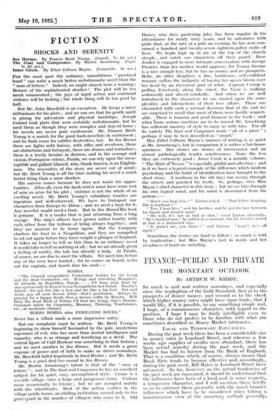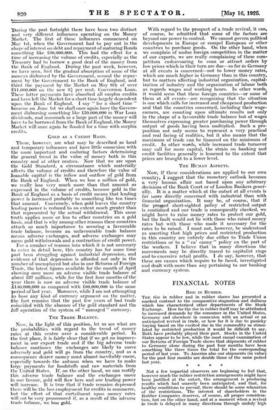FINAL CE7-PUBLIC AND PRIVATE
THE MONETARY OUTLOOK •
BY- ARTHUR W. KIDDY.
So much is said and written nowadays, and especially since the readoption -Of the Gold Standard, first as to the prospects of dearer money, and second as to the check which higher money rates might have upon trade, that I would like, if it is possible, to say something simple and, I hope, of a 'commonsense character, with regard to the Position. I hope I may be fairly intelligible even to those who do not profess to be familiar with what are sometimes' described as Money Market intricacies.
LOCAL AND TEMPORARY INFLUENCES.
.During the past week there has been a considerable rise in money rates in Lombard Street, and whereas a few weeks ago supplies of credits were abundant, there has been actual scarcity during the past week, and the Market has had to borrow from the Bank of England. That is a condition which, of course, always means that Bank Rate tends to become effective and, accordingly, during the past week, Bill Rates in Lombard Street have advanced. So far, however, as the actual tendencies of the past week are concerned, it should be understood that the influences have been of a local,and, in some respects, a temporary character, and I will mention them briefly so as to contrast them presently with the much broader influences which have to be considered when taking a commonsense view of the monetary outlook generally, 'During the past fortnight there have been two distinct and very different influences operating on the Money Market. The first of these influences commenced on May 1st, when the Government had to pay out in the shape of interest on debt and repayment of maturing Bonds something like £30,000,000. This had the effect for a time of increasing the volume of credits, especially as the Treasury had to borrow a good deal of the money from the Bank of England. During the past week, however, we have seen, first the gradual absorption of some of the moneys disbursed by the Government, second the repay- ment by the Government to the Bank of England, and third the payment by the Market on May 8th of over £11,000,000 on the new 3/ per cent. Conversion Loan. These latter payments have absorbed all surplus credits and have left the Market for a short time largely dependent upon the Bank of England. I say " for a short time " because on June 1st we shall once again have the Govern- ment disbursing something like £50,000,000 in War Loan dividends, and inasmuch as a large part of the money will have to be borrowed from the Bank of England, the Money Market will once again be flooded for a time with surplus credits.
GOLD AS A CREDIT BASIS.
These, however, are what may be described as local and temporary influences and have little connexion with the more important and enduring factors determining the general trend in the value of money both in this country and at other centres. Now that we are upon the Gold Standard, a circumstance which materially affects the volume of credits and therefore the value of loanable capital is the inflow and outflow of gold from the Bank of England. When we lose a million of gold, we really lose very much more than that amount as expressed in the volume of credits, because gold in the Bank of England as a basis of credit means that lending power is increased probably to something like ten times that amount. Conversely, when gold leaves the country lending power is reduced to an extent much greater than that represented by the actual withdrawal. This same truth applies more or less to other countries on a gold basis, and that is why among other reasons these countries attach so much importance to securing a favourable trade balance, because an unfavourable trade balance means adverse exchanges, and adverse exchanges may mean gold withdrawals and a contraction of credit power.
For a number of reasons into which it is not necessary to enter in detail here, this country has for some time past been struggling against industrial depression, and evidence of that depression is afforded not only in the number of unemployed but also in our Returns of Foreign Trade, the latest figures available for the month of April showing once more an aciverse visible trade balance of about £37 millions, while for the first four months of the year there is now an adverse visible- trade balance of .1140,000,000 as compared with £80,000,000 in the same period of last year. Moreover, while I am not attempting J o base any kind of currency argument on the matter, the fact remains that the past few years of bad trade coincided with the absence of the gold standard and the full operation of the system of " managed " currency.
THE TRADE BALANCE.
Now, in the light of this position, let us see what are the probabilities with regard to the trend of money rates at this centre over a considerable period. In the first place, it is fairly clear that if we get no improve- ment in our export trade and if the big adverse trade balance continues the exchanges are likely to move adversely and gold will go from the country, and as a consequence dearer money must almost inevitably ensue, especially towards the autumn when we have to make large payments for foodstuffs and raw materials from the United States. If, on the other hand, we can rectify this adverse trade balance and the exchanges move in our favour, gold will flow here and our lending power will increase. It is true that if trade remains depressed there will be the lass employment for credits in commerce, but the effect of that curtailment upon money rates will not be very pronounced if, as a result of_the adverse trade balance, we lose gold. With regard to the prospect of a_trade revival, it can, of course, be admitted that some of the factors are beyond our power to control. We cannot govern political developments in Europe or compel European or other countries to purchase goods. On the other hand, when We complain of undue foreign competition in the matter of our exports, we are really complaining of these com- petitors endeavouring to coax or attract orders by low prices.which in their turn are due—so far as Germany at all events is concerned—not to lower money rates, which are much higher in Germany than in this country, but to matters affecting industrial organization, capital- ization of industry and the organization of labour both as regards wages and working hours. In other words, it would seem that these foreign countries—or some of them at all events—are recognizing that the situation is one which calls for increased and cheapened production and that the countries concerned, including their wage- earners, are counting upon ultimate results not only in the shape of a favourable trade balance but of wages themselves expressing greater purchasing power through output of goods having been multiplied. Such a pro- position not only seems to represent a very practical and real facing of realities, but it also means that the maximum of trade can be financed on the minimum of credit. In other words, while increased trade turnover may call for more capital, the strain on banking and credit facilities generally is lessened to the extent that prices are brought to a lower level.
THE HUMAN ASPECTS.
Now, if these considerations are applied to our own country, I suggest that the monetary outlook becomes a very human affair not based upon any arbitrary decisions of the Bank Court or of London Bankers gener- ally. It is a matter which at the outset at all events is far more directly concerned with industrial than with financial organization. It may be, of course, that if the prernt short-sighted policy of restricted output is continued and our trade is consequently checked, we might have to raise money rates to protect our gold, but the fault would not lie with those who raised money rates but with those who made it necessary for the rates to be raised. I must not, however, be understood as asserting that high prices and restricted production in this country are entirely due either to Trade Union restrictions or to a " ca' canny " policy on the part of the workers. I believe that in Many directions the movements may be directly traced to capitalist rings and to excessive retail profits. I do say; however, that these are causes which require to be faced, investigated and dealt with more than any pertaining to our banking and currency system.











































 Previous page
Previous page